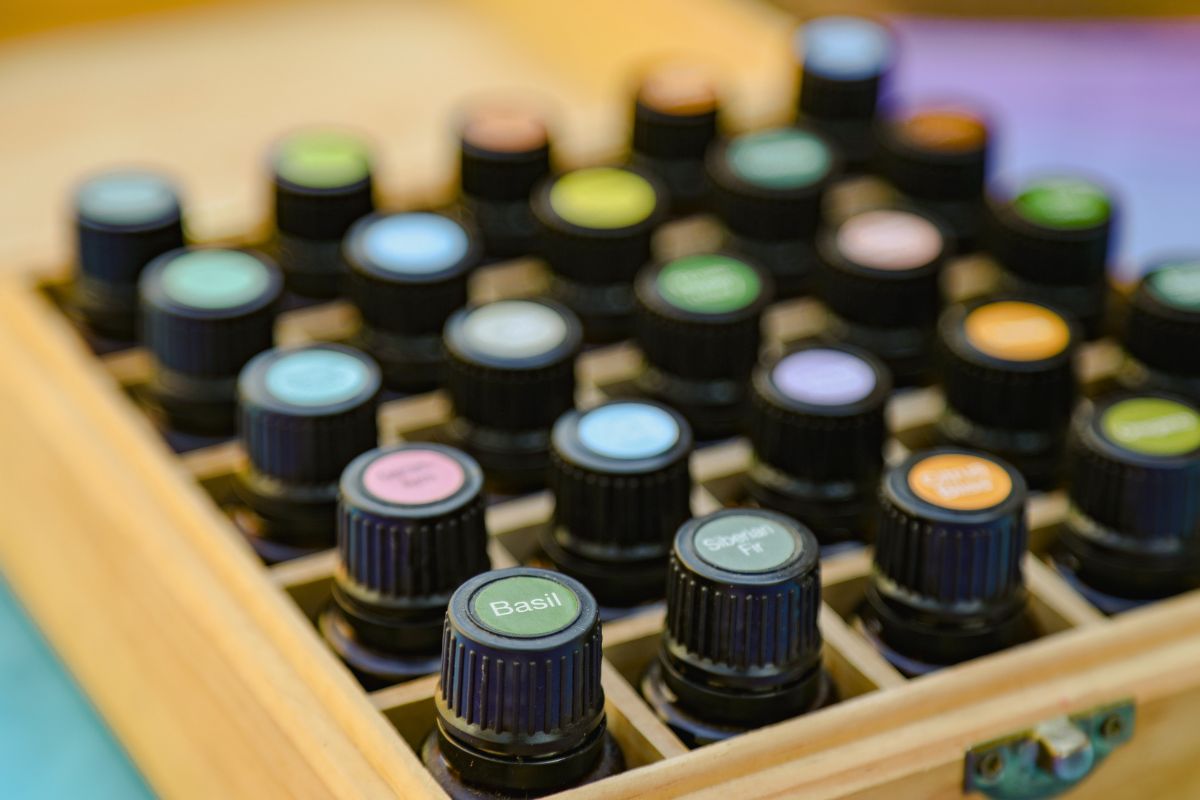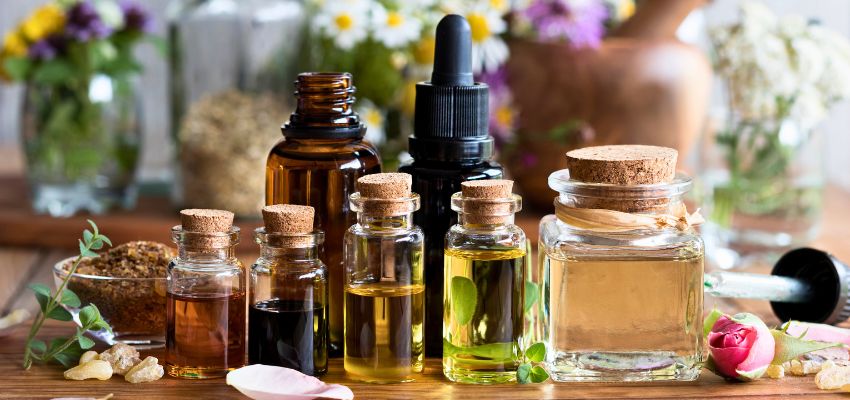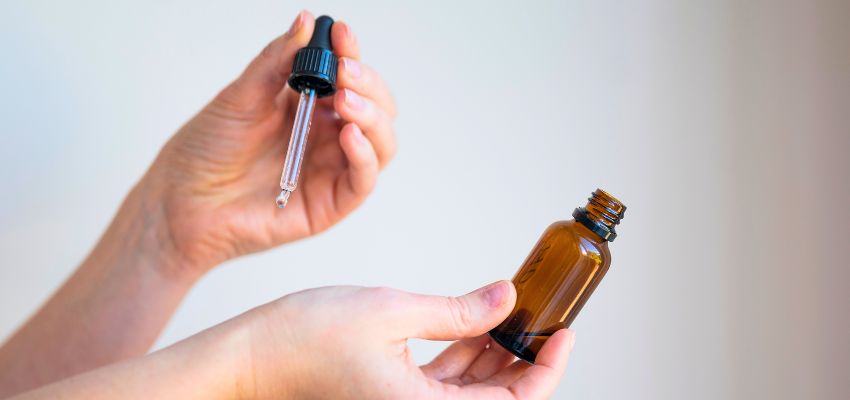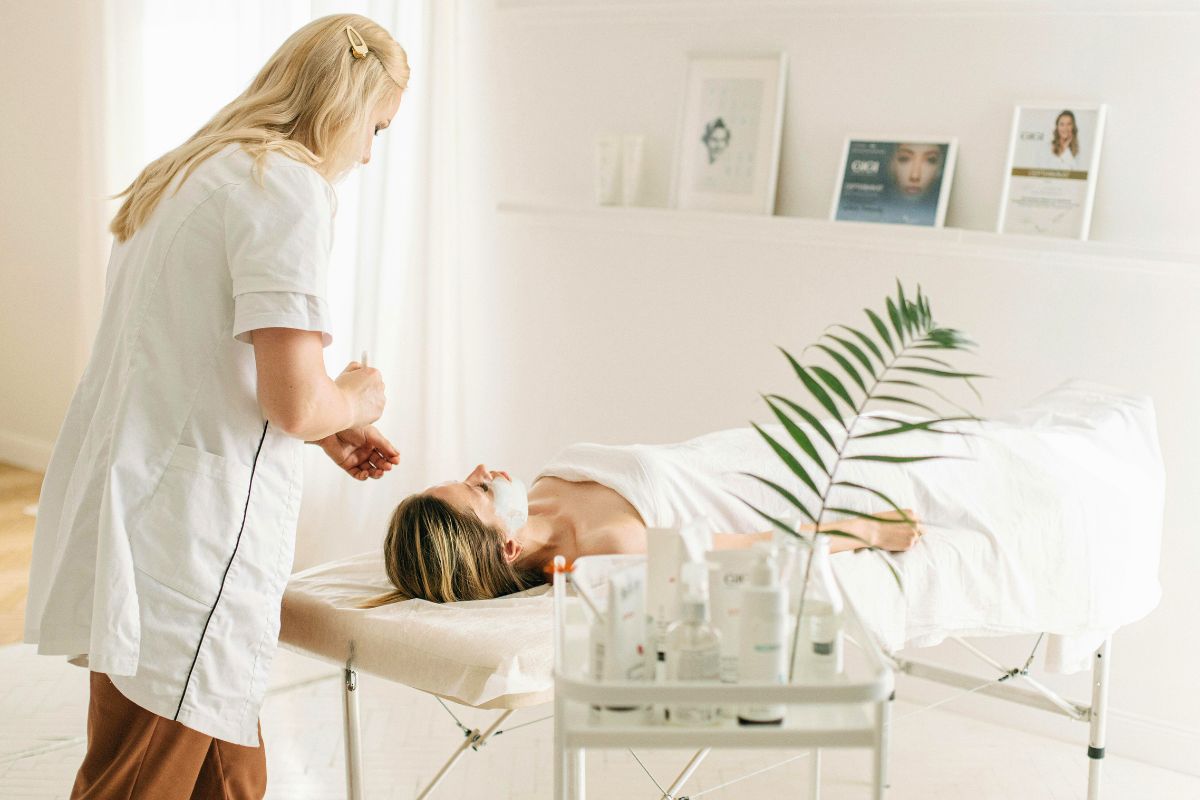Essential Oils And Skin Safety: Myths Vs. Facts Explained

Published August 26, 2025
Are essential oils safe for skin? They’re popular for their natural appeal and potential benefits. But here’s the catch: they aren’t always harmless. Misleading safety claims can lead to irritation and lasting problems. Know the risks before adding them to your routine.
In this article, we’ll separate fact from fiction to help you decide if essential oils should be part of your skincare routine. We’ll cover the science behind these plant compounds, debunk myths, and offer evidence-based tips for safe use.
What Are Essential Oils?
Essential oils are concentrated, aromatic compounds obtained from plants. They come from flowers, bark, stems, leaves, roots, or fruits. These oils capture a plant’s unique fragrance and flavor. Techniques like cold pressing or steam distillation are used to extract them.
Because essential oils are so concentrated, one drop of peppermint oil is equivalent to around 28 cups of peppermint tea. Such potency can easily overwhelm skin defenses and trigger irritation.
Essential oils are intricate blends, often composed of up to 60 different chemical compounds. Some, like caffeic acid and rosmarinic acid, provide legitimate antioxidant benefits. However, ingredients like limonene, citronellol, and linalool, often found in fragrances, can cause skin irritation and sensitivity.
The volatility that creates their unique aroma also means these compounds can quickly evaporate and penetrate the skin, sometimes disrupting the skin’s natural barrier and causing irritation or allergic reactions.

Why Are They Popular In Skincare?
Essential oils are well-loved in skincare for their natural origins, appealing to those seeking alternatives to synthetics. Many contain antioxidants and antimicrobial compounds that may support skin health.
Another draw is aromatherapy. Soothing or invigorating scents offer psychological comfort and a sensory boost. Yet this pleasant experience can mask potential skin damage beneath the surface.
Marketing highlights traditional plant use, boosting appeal. Many cultures have used these remedies for centuries, but tradition doesn’t guarantee effectiveness or safety by modern standards.
Common Myths About Essential Oils For Skin
Are essential oils safe for skin? While many claims promote them as natural and safe skincare solutions, these often lack scientific evidence. Misconceptions about safety can lead to irritation and other skin issues. Let’s debunk common myths about essential oils for skin.
Myth 1: “Natural Means Safe And Gentle”
One of the most common and dangerous myths about essential oils is the belief that their natural origin ensures safety. This misconception has led many to apply undiluted oils directly to their skin, often resulting in painful reactions.
Natural substances can be potent and harmful. Poison ivy and ricin are natural yet dangerous. What matters is a substance’s concentration and composition, not its source.
Natural doesn’t always mean safer. Essential oils can cause irritation and long-term harm. Safer choices usually exist, and it’s important to evaluate risk before use.
Myth 2: “Essential Oils Can Treat Acne Safely.”
Tea tree oil is often promoted as a natural remedy for acne. Some studies suggest it has mild antimicrobial properties, but evidence of its effectiveness in treating acne is inconclusive.
Research shows tea tree oil has antibacterial benefits, but compared to established acne treatments like benzoyl peroxide, tea tree oil is less effective and often causes more frequent side effects, such as sensitization and contact dermatitis.
Many “acne-fighting” oils like rosemary, lemongrass, thyme, and cinnamon may worsen acne because they tend to cause more irritation and inflammation compared to treatment ingredients designed for sensitive skin, increasing the risk of scarring.
Myth 3: “Essential Oils Don’t Harm The Skin; They Soothe.”
This myth is dangerous because essential oils can harm the skin before you notice it. Irritation may build for months before signs appear.
Essential oils can cause contact dermatitis, allergies, and phototoxicity. Even “gentle” oils like lavender aren’t risk-free and have been linked to dermatitis and possible hormone effects.
Essential oils can quicken visible aging by causing more irritation and breaking down skin proteins like collagen and elastin compared to gentler options, leading to wrinkles—the opposite of what users want.
Myth 4: “They’re Safe Because They’re Unregulated”
Many assume that the FDA’s lack of oversight for essential oils implies they’re safe. In truth, this regulatory gap poses significant risks to consumers.
Essential oils vary widely in quality and composition, with no standardized purity requirements. Some may contain additives or contaminants that cause irritation.
Without safety testing, consumers risk exposure every time they use essential oils.
Must-Know Facts Before Using Essential Oils
Essential oils offer many benefits, but it’s important to use them safely. Proper dilution and toxicity awareness can prevent skin reactions, hormonal issues, or risks to children and pets. Here’s how to use essential oils responsibly.
Proper Dilution Is Crucial
Undiluted essential oils are too concentrated for direct skin use and can cause irritation. Always dilute before applying to the skin. For facial use, dilute essential oils to 0.5%–2%. Add 3–6 drops per ounce of carrier oil, like jojoba, almond, or coconut.
Even properly diluted, reactions can occur. Dilution is a precaution, not a safety guarantee. Always use essential oils with care.
Some Oils Are Phototoxic
Citrus oils like bergamot and lemon can cause phototoxic reactions under UV light, leading to burns and dark spots. Symptoms from these reactions appear 12–24 hours after sun exposure and can last for months or become permanent.
Even a small amount of citrus oils can cause phototoxic reactions. Avoid the sun for 12–18 hours after use.
Risk Associated With Popular Essential Oils
- Tea Tree Oil: Evidence for benefits is limited. It may help minor fungal infections, but its use for acne is unproven. Risks include dermatitis, possible hormone effects, and high toxicity if ingested.
- Lavender Oil: Often seen as gentle, lavender oil can cause dermatitis or allergies. Some research links it to hormone disruption. It’s also toxic if ingested, especially for children.
- Peppermint Oil: The cooling sensation often masks underlying irritation. It can cause chemical burns and is especially hazardous if it comes into contact with the eyes or mucous membranes.
- Eucalyptus Oil: Eucalyptus oil can be soothing when inhaled, but it’s irritating to the skin and toxic if ingested. Even minimal amounts can lead to severe health complications.
Safety For Sensitive Groups
Children, pregnant people, and pets are more sensitive to essential oils. Extra caution is needed. During pregnancy, some essential oil compounds can potentially cross the placental barrier. The full effects are unclear, so it’s safest to avoid using essential oils topically during pregnancy and breastfeeding to reduce potential risks.
Pets, especially cats, are very sensitive to essential oils. What’s safe for humans can be toxic or fatal for them. When it comes to sensitive groups, safety should always come first.

Always Patch-Test Before Use
Even if you’ve safely used an essential oil in the past, performing a patch test is essential. Sensitization can develop over time, meaning you may suddenly become allergic to an oil you once tolerated.
To patch-test, apply a little diluted oil to your inner forearm and wait 24–48 hours. Stop if you react. Keep in mind, patch tests aren’t foolproof. Some allergic reactions take longer to appear, and the tested area may not react the same way as more sensitive skin, like that on your face. Always proceed with caution.
Safe Practices For Essential Oil Use On Skin
Choose Quality And Read Labels
When using essential oils, choose reputable suppliers that provide details like botanical name, origin, and extraction method. Follow warnings and avoid sun exposure, use during pregnancy, or apply to sensitive areas. Steer clear of products that make medical claims.
Use Alternatives When Possible
Non-fragrant oils like rosehip and jojoba offer benefits without irritation risks. For aromatherapy, use a diffuser instead of skin contact. Ingredients like niacinamide and salicylic acid are safer for skin concerns.
Consult With Healthcare Providers
See a dermatologist before using essential oils, especially if you have skin conditions or take medications. Some oils cause adverse reactions or interact with treatments. Stop use if you notice severe or persistent side effects.
Frequently Asked Questions
Can essential oils be safely used on all skin types?
Essential oils are not safe for all skin types. Individuals with non-sensitive skin may experience reactions over time, and those with sensitive skin, eczema, or conditions face an even higher risk.
Do essential oils increase the risk of sun damage?
Some essential oils, especially citrus-based ones, can cause burns or pigmentation changes under UV light.
What should I do if I have a reaction?
Stop using the oil and wash the area with mild soap. If blistering, severe redness, or trouble breathing occur, seek medical help.
Can I use essential oils on my face?
Facial skin is more sensitive, making it prone to reactions. If using essential oils, dilute to 0.5% or less and patch test first.
Is it safe to use during pregnancy or on children?
During pregnancy and breastfeeding, avoid essential oils on the skin. Never use them on children under six, and always consult a healthcare professional.
Which essential oils are safe for a dog’s skin?
Most essential oils aren’t safe for dogs. Some, like chamomile and lavender, may be used with veterinary supervision. Never let dogs ingest essential oils.

Essential Oils In Skincare: Beauty Or Hidden Risk?
While essential oils may provide pleasing aromas, many people wonder, “Are essential oils safe for skin?” The truth is, they can irritate and even harm the skin when applied topically, even in diluted forms, and the risk of skin reactions is generally higher than with well-studied ingredients such as retinoids, salicylic acid, or jojoba oil. Safer options like these are more effective for skin concerns. Use essential oils responsibly with a diffuser, and avoid direct skin application. Remember, “natural” doesn’t always mean safe—choose your skincare products thoughtfully.
Take control of your skincare routine—schedule a personalized session with the experts at Salon Suites Wellington. Get tailored advice to keep your skin safe and healthy. Book your appointment today and make informed choices about essential oils.
Rent Salon Space In Wellington Florida
Rent salon space in Wellington with us. Whether you’re a hairstylist, nail technician, or any other beauty professional, we provide the ideal environment to help your business thrive. Our Wellington salon suites offer a wide range of benefits, including complimentary cleaning services, flexible lease terms, and a welcoming atmosphere designed to make your clients feel at home. Elevate your career and build your brand by leasing salon space in Wellington.

About The Author
Meet Rei Bayucca, a professional writer and passionate expert in all things related to beauty. Every article is purposely designed to assist you in tackling your most challenging dilemmas. Rei’s knack for creating engaging content is guaranteed to ignite your curiosity.



